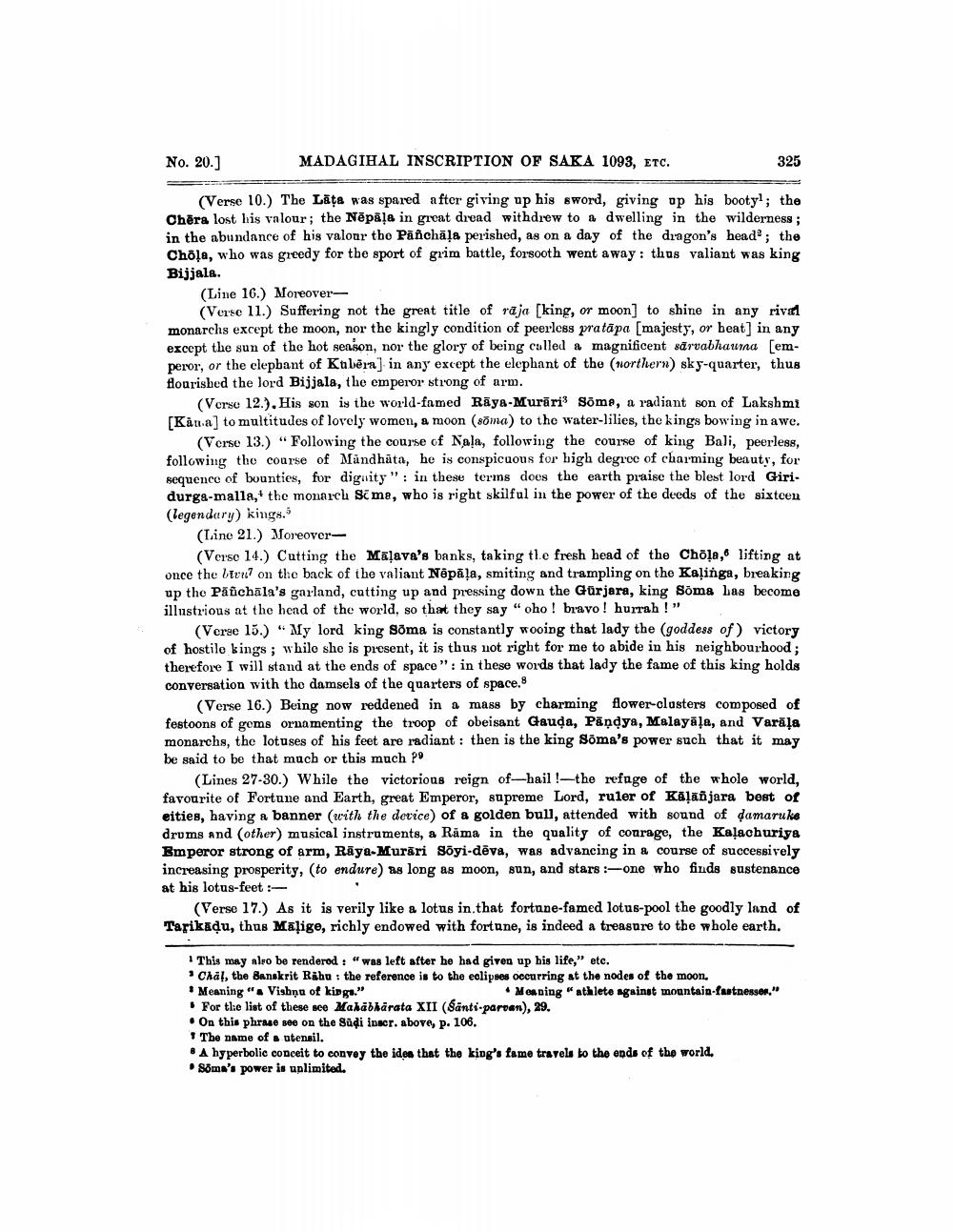________________
No. 20.)
MADAGIHAL INSCRIPTION OF SAKA 1093, ETC.
325
(Verse 10.) The Lāța was spared after giving up his sword, giving op his bootyl; the Chēra lost his valour; the Nēpāļa in great dread withdrew to a dwelling in the wilderness; in the abundance of his valour the Panchāļa perished, as on a day of the dragon's head; the Choļa, who was greedy for the sport of grim battle, forsooth went away: thus valiant was king Bijjala.
(Line 16.) Moreover
(Verse 11.) Suffering not the great title of raja [king, or moon] to shine in any rival monarchs except the moon, nor the kingly condition of peerless pratāpa (majesty, or beat] in any except the sun of the hot senson, nor the glory of being called a magnificent sarvabhauna [emperor, or the clephant of Kuběra] in any except the elephant of the northern) sky-quarter, thus flourished the lord Bijjala, the emperor strong of arm.
(Verso 12.), His son is the world-famed Rāya-Murāri Sõme, a radiant son of Lakshmi [Kana] to multitudes of lovely women, a moon (soma) to the water-lilies, the kings bowing in awe.
(Verse 13.) "Following the course of Nala, following the course of king Bali, peerless, following the course of Mindháta, he is conspicuous for high degree of charming beauty, for sequence of bounties, for dignity": in these terms does the earth praise the blest lord Giridurga-malla, the monarch Sime, who is right skilful in the power of the deeds of the sixteen (legendary) kings.
(Line 21.) Moreover
(Verse 14.) Cutting the Māļava's banks, taking tle fresh head of the Chola, lifting at once the liund on the back of the valiant Nēpāļa, smiting and trampling on the Kalinga, breaking up the Päichāla's garland, cutting up and pressing down the Gürjara, king Soma has become illustrious at the head of the world, so that they say "oho! bravo ! hurrah!”
(Verse 15.) My lord king Soma is constantly wooing that lady the goddess of) victory of hostile kings; while she is present, it is thus not right for me to abide in his neighbourhood; therefore I will stand at the ends of space": in these words that lady the fame of this king holds conversation with the damsels of the quarters of space.
(Verse 16.) Being now reddened in a mass by charming flower-clusters composed of festoons of goms ornamenting the troop of obeisant Gauda, Pāņdya, Malayala, and Varāļa monarchs, the lotuses of his feet are radiant : then is the king Soma's power such that it may be said to be that much or this much po
(Lines 27-30.) While the victorious reign of-hail !-the refage of the whole world, favourite of Fortune and Earth, great Emperor, sapreme Lord, ruler of Kalajara best of eities, having a banner with the device) of a golden bull, attended with sound of damaruke drums and (other) musical instruments, a Rāma in the quality of courage, the Kalachuriye Emperor strong of arm, Rāya-Murāri Soyi-dēva, was advancing in a course of successively increasing prosperity, (to endure) as long as moon, sun, and stars :-one who finds sustenance at his lotus-feet :
(Verse 17.) As it is verily like a lotus in that fortune-famed lotus-pool the goodly land of Tarikādu, thus Māļige, richly endowed with fortune, is indeed a treasure to the whole earth.
This may also be renderod : "was left after he had given up his life," etc. • Chal, the Sanskrit Rähu : the reference is to the eclipses occurring at the nodes of the moon. * Meaning ". Vishna of kings."
Meaning "athlete against mountain-fatnesser." . For the list of these sce Mahabharata XII (Santi-parvan), 29. • On this phrase see on the Südi inscr. above, p. 106.
The name of a utensil. 8 A hyperbolic conceit to convey the idea that the king's fame travels to the ends of the world. . Soma's power is uplimited.




